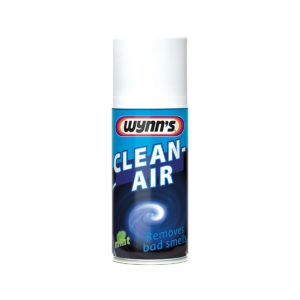How good is the air quality inside our cars?
Most cars today are equipped with air conditioning (A/C) or climate control systems. These systems operate independently from the heating system and cool the temperature of the ambient air, which is then ventilated in the passenger compartment. This air can generate unpleasant odors.
Advances in the electronic management and control of air-conditioning systems have made it possible to regulate and maintain the temperature inside the car between 16-32°C.
For the systems to work optimally, they must be in constant use. If this is not the case, manufacturers recommend switching the systems on at their coldest setting at least once a week.
Air-conditioning systems can cause problems all year round. When conditions are damp, condensation builds up in the evaporator (a heat exchanger that cools room-temperature air in air vents), which becomes an ideal breeding ground for mold and fungi. As mould grows, so do bacterial spores, which can have harmful effects on vehicle passengers. This is when it becomes essential to purify the air in a car.
Why do bad smells appear inside vehicles?
During the summer months, when the air conditioning is switched back on, the unpleasant odors produced by mould and fungal bacteria are released into the passenger compartment. The result is poor air quality and an unpleasant driving experience.
A condition known as “sick car syndrome” can also occur. This occurs when bacterial spores released by moulds and fungi are inhaled, causing flu-like symptoms in people with sensitive respiratory conditions.
Under normal conditions, excess condensation runs off the evaporator and is discharged through a drain tube. If the tube is blocked, water accumulates at the bottom of the duct and stagnates, developing fungi and bacterial mould.
When parking the vehicle after using it with the air conditioning on, it’s a good idea to look underneath to see if there’s any water. If there’s no water, the evaporator drain is clean and moisture is escaping.
If there is water after a period of driving, it’s a sign that the car needs to be inspected and the evaporator drain cleaned to reduce odors and water build-up inside the heater box.
The cabin filter is also an integral part of the system, as it filters the air entering the ventilation system. Over time, if not cleaned, it clogs up and reduces the flow of air into the vehicle, affecting the system’s operation. The result is stale air in the cabin. Checking or replacing the cabin filter at every service interval is essential to ensure efficient operation of the heating and ventilation systems.
Therefore, air conditioning and climate control systems must be used correctly. If not, problems can arise and need to be solved using chemical cleaners to eliminate mould and mildew from the evaporator and kill any bacteria that could have an impact on health.
How do I get rid of car odours?
When there’s a bad smell inside the car, or when the fans are switched on, there are various ways of solving the problem.
Manual treatment
The evaporator and heating matrix are located behind the dashboard, in the heater box and are difficult to access. Cleaning them manually is labour-intensive, costly and challenging, but possible.
Chemical treatment
A chemical treatment applied to the car’s interior is the most effective way of treating this system and eliminating odors.
Some garages offer decontamination services. These methods involve placing a machine inside the vehicle and applying an antibacterial and deodorizing treatment to the interior surfaces and the entire ventilation system. These treatments can reach hard-to-reach areas and kill bacteria, eliminating unpleasant odors and leaving the cabin smelling fresh.
Other methods involve the use of an aerosol or “air-conditioning pump”. These are activated inside the vehicle and fill the cabin with a fine mist. When choosing these treatments, endure they are effective and approved for eliminating bacteria and fungi. Well-formulated products protect the car for up to six months. In this way, odors are eliminated at source and not simply masked by a short-term air freshener. We recommend treating the HVAC system with Clean Air every 12 months.


Leave A Comment